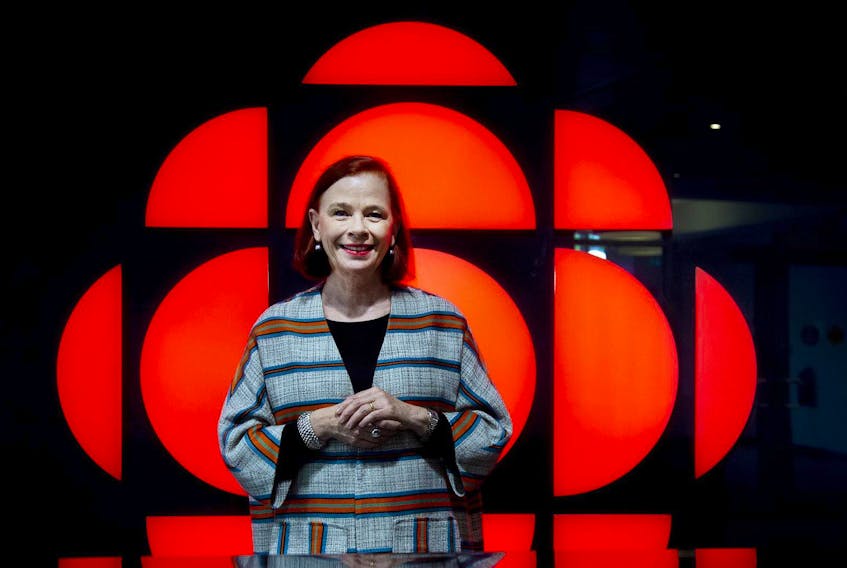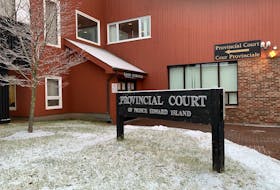Thinking of the CBC as strictly a government-funded institution isn’t exactly the whole picture, says the president and CEO of the public broadcaster.
“CBC is a business,” Catherine Tait said during an interview Monday at CBC’s Halifax headquarters.
“CBC is a very peculiar business. It has a very unique role and structure. It is, on the one hand, a Crown corporation and receives over two-thirds of its budget from a Parliamentary allocation, for which we are enormously grateful to the Canadian people each and every day, but it also earns close to $400 million in earned revenue, either through advertising or other commercial activities.
“So we are a hybrid structure, and it’s important to know that we are not alone in this hybrid structure. Every public broadcasting company in the world also has this mixed model.”
Tait, who is in the city for a CBC public meeting Tuesday evening, is a veteran television and film executive. She worked at Telefilm Canada in the 1980s and was president of Salter Street Films, the company that produced the CBC staple This Hour Has 22 Minutes, in Halifax from 1997 to 2001.
The size of the country and the scope of CBC’s obligation to provide services in two official languages obligate it to pursue commercial revenue, she said.
“The dollars that we earn in commercial activity allow us to do many of the things that would not otherwise be supportable; for example, services to the North, services to French-language communities outside of Quebec,” Tait said.
“These are places where the private sector would never play because there’s no chance to make money.”

“Google and Facebook represent 75 per cent of digital advertising in this country. They come into the country, they hoover up those digital ad dollars, and they take them out to operate their worldwide businesses.”
- Catherine Tait, president and CEO, CBC
Digital dollars
The notion of CBC not being allowed to pursue advertising is occasionally floated, especially by small digital publishers of news. Tait argues that the real enemies are much bigger.
“A couple of key facts, important to know: In the conventional advertising space, CBC/Radio-Canada represents just around eight per cent of all conventional advertising dollars. Not that huge a number.
“In the digital advertising space, we represent less than one per cent of digital advertising.
“Who is the problem? The CBC, or Google and Facebook? Google and Facebook represent 75 per cent of digital advertising in this country. They come into the country, they hoover up those digital ad dollars, and they take them out to operate their worldwide businesses.”
Tait said her response to some local news companies that she recognizes as suffering has been to partner with them. She cited collaborating with Torstar on investigative news.
In 2016, the federal Liberals increased funding of the CBC by $675 million over five years. In that year’s budget, the government invested an additional $75 million in CBC/Radio-Canada for 2016-17, rising to $150 million in the following years.
Taxpayers contribute about $1.2 billion annually to the CBC, and Conservative Leader Andrew Scheer recently mused about increasing scrutiny of the organization if he became prime minister.
Tait said executives are not wasting energy thinking about whether CBC funding will be an issue in the fall election.
“Everybody has an opinion about the CBC/Radio-Canada, and that is what is great about this country. You’re born in Canada or you become a new Canadian, and you get a membership to the CBC and Radio-Canada for your life,” she said.
“If we spent time in a war room worrying about the next election, we would not be doing the public a particularly good service. We’re focused on covering the election in the most fair and transparent and equitable fashion that we can.”
Streaming service
In September, Tait announced a new CBC streaming service, Gem, but she has been criticized for comparing the influence of Netflix to colonial imperialism, raking in profits and not providing enough localized content.
“Perhaps the original statement was a little ham-fisted,” she said.
“My position on the global giants is unchanged.
“I would expand the comment now to say we live in a world where Google, Facebook, Amazon, Apple and Netflix and Spotify are dominating this country’s media consumption, and worldwide.”
Tait is the first woman selected for the top CBC job. She replaced Hubert Lacroix last year.
Her current national tour of public forums is highlighting a new strategic plan, Your Stories, Taken to Heart.
“We have an obligation to meet with the public every year, it’s part of being a Crown corporation and a public broadcaster,” she said.
“We will only be relevant if we reflect the reality of Canada.”
As for anyone who might contend that upcoming high-profile programming like Family Feud Canada, starring Gerry Dee, is not quality CanCon, Tait enthusiastically disagrees.
“Don’t forget our mandate: inform, enlighten and entertain. Obviously, Family Feud Canada falls in the entertain bucket, and entertainment for us means bringing Canadians together.”
Tait said she still uses some advice that she got during her time at Salter Street.
“I always remember (co-founder) Michael Donovan saying to me, ‘What is our key competitive advantage?’
“So that resonates for me in my entire career. What is our key competitive advantage? What is our differentiator as a public broadcaster?
“It’s our proximity to Canadians. We’re 60 locations across the country, we’re boots on the ground, we’re close to our listeners, and no digital giant will ever have that, and that’s what we’re focused on.”
RELATED:









